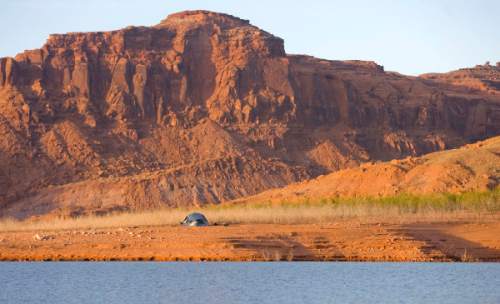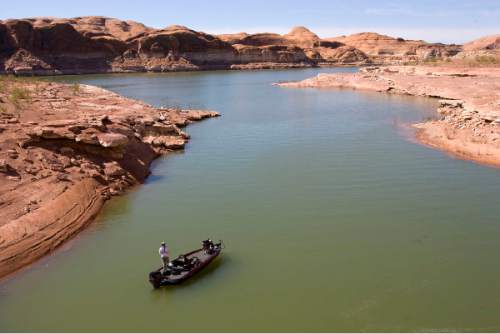This is an archived article that was published on sltrib.com in 2016, and information in the article may be outdated. It is provided only for personal research purposes and may not be reprinted.
Dozens of environmental activists and concerned citizens flooded a regularly scheduled meeting of the Utah Board of Water Resources on Thursday to raise questions about the accuracy of publicly available information on the Lake Powell Pipeline.
Just over 20 members of the audience told the board that they questioned the accuracy of the studies and data used to support the pipeline project, and raised concerns about the lack of public input in the process. Speakers said questions and comments submitted during the studies that went into the Lake Powell Pipeline's Preliminary Licensing Proposal, currently undergoing a public review, were never addressed. They also complained that the current public review process included public open houses in southern Utah but not the Wasatch Front.
"I think the public outreach for this project has, frankly, been terrible," said Gordon Rowe, research director for the Utah Rivers Council. "For us to have to crash your board meeting and be given flashing numbers and short time limits is not outreach."
There was no audience response time following the meeting's brief report on the status of the PLP's public review. Instead, those who indicated via comment card that they wished to speak were given two minutes each before the meeting adjourned.
Members of the board suggested cutting the time to one minute per person to prevent the meeting from going over time, but abandoned the idea when the assembled crowd responded with shouting and booing.
"We are being excluded," Lisa Rutherford, an Ivins resident who drove to Salt Lake City at her own expense to speak to the board, said after the meeting. "There are back-room deals. They are not giving us the details. We do not get to vote for it … I think if it were put to a vote, they would be surprised on this issue."
Speakers repeatedly accused the state and the Washington County Water Conservancy District of offering contradictory information to the public and various stakeholders, especially where water — a shortage of which is cited as the reason southwestern Utah needs the pipeline — was concerned. Washington County residents testified that Ron Thompson, general manager of the water district, has told residents that the water district could come up with more than 100,000 acre feet of water to sustain growth even if the pipeline were not built. Others pointed to the state water audit, which indicates Utah's water supply will grow over the course of the next several decades as agricultural lands are converted to urban and suburban landscapes.
"We are not running out of water," said Nick Schou, conservation director for the Utah Rivers Council. "[The PLP] ignores 100,000 acre feet of water that is going to be available because we are building homes on farmland. We need to see a change and we need to stop playing games."
Others also questioned the financial feasibility of the project, and the rough cost estimates reported to the public. Though there is currently no official price tag for the Lake Powell Pipeline project, Washington County officials have repeatedly estimated costs in the range of $1 billion.
But Paul Van Dam, a former Utah attorney general who now lives in St. George, questioned whether $1 billion is really in the ballpark.
"This is not a $1 billion pipeline," he said. "I've studied pipelines all over the country. ... This is a $3 billion pipeline, and by the time you add that price to interest over 50 years, you have a project that is unaffordable to the people in our county."
The activists also decried the water resources board for their support of SB80, which they characterized as an attempt to earmark money for projects like the Lake Powell Pipeline under the guise of funding repairs to the state's aging water infrastructure.
The pipeline, they said, would rob many Utah communities of necessary upgrades and repairs while providing water to an area that could meet its own needs with conservation initiatives.
"I have a feeling [that this is like] weapons of mass destruction," said Martha Ham, a shareholder in the Leeds Domestic Water-users Association. "I fear that this is where we are going with flawed data about the Lake Powell Pipeline.
"Please give conservation a chance," she said. "It sounds like a song, but it should be."
Members of the Board of Water Resources did not respond to the comments during the meeting.
Twitter: @EmaPen





